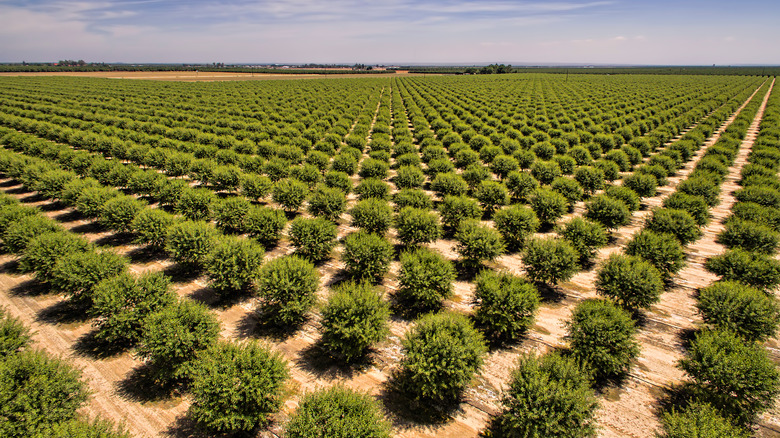How California Ended Up With A Ridiculous Amount Of Extra Almonds
For decades, it seems that the peanut has been the go-to nut when it comes to food products, but the almond is gaining ground. From almond milk and almond butter to almond meal and almond flour gaining traction in the marketplace, this teardrop-shaped seed (yes, it's the seed of the almond fruit and not an actual nut at all) is surely a hot commodity.
After all, according to the US Department of Agriculture, the almond is the nation's most popular tree nut. Agricultural Economic Insights says that as of 2017 Americans began eating an average of two pounds per person each year, a huge increase from the average consumption recorded twenty years prior of just over half a pound. The Washington Post further illustrates this shocking increase by reporting a 220% rise in demand since 2005. It is important to note, however, that the peanut is not a "tree nut" as they are legumes that grow beneath the ground. So, the peanut still reigns as the top nut, per The Washington Post.
Sunny California holds the title as the world's largest almond producer, supplying roughly 80% of the planet's almonds (via Almond Board of California). With the demand for almonds steadily increasing, one would think that these tree nuts would be scooped up as fast as they're grown. However, California has wound up with an alarming amount of stranded almonds on their hands.
Over a billion pounds of almonds sit in limbo
Los Angeles Times reports that approximately 1.3 billion pounds of almonds have been left in stockpiles with nowhere to go. That is a huge amount of nuts. Why haven't they headed off to buyers around the world? The problem is largely due to the beating that the pandemic has unleashed upon the global supply chain. Food & Wine says that a shortage of available shipping containers has resulted in them being transported back to Asia empty without enabling them to stop at the Port of Oakland to load up with almonds first. Therefore, the almonds remain and customers around the world are left waiting for them.
Unfortunately, as the almonds await transport the approximately 7,600 farmers who grew them remain unpaid for their crops (per Los Angeles Times). But time is of the essence as almonds are yielding a record low price of just $2 a pound, while the cost of growing them is becoming overly burdensome. Water supplies are costly thanks to California's ongoing drought and inflation rates are astronomical. If the almond's selling price declines further, the farmers will be out even more money. The only light at the end of this almond-lined tunnel is that, according to Food & Wine, these tree nuts will keep for about two years. The farmers' finances, however, may not.

